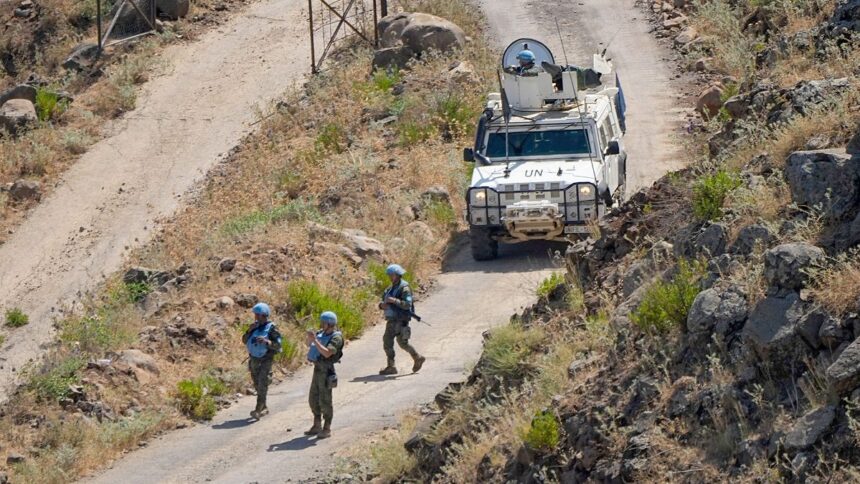As the Israeli army continues to pressure the UN peacekeepers to abandon southern Lebanon, the international community remains seemingly hesitant in its response, turning UNIFIL into a should-I-stay-or-should-I-go mission.
As US diplomacy seeks last-minute solutions for a ceasefire in Lebanon right before the presidential elections, the Israeli army has increased its pressure against the alleged Hezbollah hideouts in southern Lebanon and Beirut.
On Sunday, an IDF bulldozer demolished a watchtower of the UN peacekeeping contingent UNIFIL in Marwahin, triggering the defence ministers of the G7 to express their “concern for all the threats” to its security and renew their support to the mission “to ensure the stability of Lebanon”.
“The IDF is likely trying to force a withdrawal of the UN forces. The pull out of the Blue Helmets will pave the way to reoccupy that territory without the presence of third elements like the UN forces,” Enzo Moavero Milanesi, former Italian foreign minister and professor of EU law at the LUISS University in Rome, told Euronews.
Among European countries, France, Germany, Italy and Spain are the biggest contributors to the Blue Helmets. Last Thursday, a German corvette ship shot down a too-intrusive drone.
This is why UNIFIL remains an important — if not vital — element of Europe’s presence in the Middle East and why European capitals feel they will be under additional pressure based on what happens to it.
“UNIFIL’s debacle could turn into a heavy flop for the United Nations. And to a certain degree, it could also be an alarming failure for Europe because this would imply the sharpening of another conflict very close to its borders,” said Milanesi.
Rules of engagement: A political firewall
Strengthening the small garrisons that have been present since 1978, most of the UNIFIL contingent was deployed after the summer war of 2006 between Israel and Hezbollah.
They were tasked with monitoring the Israeli army withdrawal and coordinating the Lebanese Armed Forces disarmament of Hezbollah in the region between the Blue Line — the border between Israel and Lebanon — and the river Litani.
According to Israel, it’s clear that the Blue Helmets did not do their job properly over the last 18 years and did not prevent Hezbollah from assembling its missile arsenal.
The UN forces came under Hezbollah’s fire on different occasions, too, especially while trying to prevent their illegitimate military activities in South Lebanon.
Israeli accusations are partially founded on facts. However, is this a good reason to fire upon the Blue Helmets, and how should the peacekeepers behave in case of a military attack?
The UN military peacekeeping missions typically must cope with the contradictions of their mandates which drastically limit the use of force through the so-called rules of engagement, French General Olivier Passot told Euronews.
“UNIFIL is not a combat tool, and it hasn’t been in combat since 1978. And, in this case, it has randomly fired back,” Passot, an experienced former UNIFIL officer on leave and an associate researcher at the French Military School of Strategic Studies (IRSEM), said.
Passot said a stronger reaction, in this specific case, could have led to an open military confrontation between the UN soldiers and IDF, aka Tsahal.
“For the soldiers of the UNIFIL it would had meant to take on the challenge of a real combat operation against an opponent like the IDF. And then what?”
“The UNIFIL soldiers do not even have the weaponry for this; they just have light weapons. And it is not part of their mandate to shot anti-tank rockets against the caterpillars of a Merkava tank,” he explained.
Despite limited retaliatory powers, the peacekeepers have room to manoeuvre when it comes to legitimate defence, Passot said.
“Legitimate defence is inherent to the rules of engagement and it allows to respond to the fire immediately. The decision is taken at the local platoon leader level. This is the rule,” he explained.
“Yet, actually, the head of platoon has to think. To hesitate, since they are afraid to provoke a political incident; and they will avoid to shot, even though theoretically it would be their full right.”
UNIFIL is a multinational coalition composed of soldiers from 50 countries worldwide.
Yet, when it comes to ground operations, the command line is national because military activities are usually carried out at the battalion level overseen by the battalion commander, a colonel with the same national and military insignias as the garrison that took part in the incident.
“If the situation is more complex, the commander must report to the chief of staff that is some miles away from the area of the exchange of fire. And it is highly possible that the chief of staff and the commander in chief of the UNIFIL will report to the UN secretary general in New York,” said Passot.
“At the end of the day, this procedure leaves a very limited initiative to the local tactical commander.”
All the EU countries that are part of the UNIFIL have cordial to great relations with Israel. So, opening fire on the IDF could have unwanted political outcomes.
Yet, warfare practice sometimes forces the soldiers to remove any kind of obstacle. In some cases, the positions of UNIFIL could be considered by the Israelis a kind of unwilling cover for the activities of the Hezbollah militias.
According to the Tsahal’s command, the Hezbollah have built tunnels, hideouts and missile launchpads just a few meters from the UNIFIL outposts.
“To attack the Blue Helmets are acts that go against the spirit and the letter of the provisions of the United Nations,” said Milanesi.
“if all the evidences that are required to prove unvoluntary or deliberate acts (attacks on the UNIFIL) are gathered, these acts don’t comply with the UN rules. In this case the UN can refer to the jurisdiction of the International Court of Justice.”
A dead-in-the-water UN resolution?
The mutual accusations among the Blue Helmets and the IDF have been running high and have gone well beyond the battlefield domain.
According to Israel, Resolution 1701 has failed to provide Israel with security against the Hezbollah military activities and has become a kind of dead-in-the-water legal document depriving UNIFIL of any international legal legitimacy to operate in South Lebanon.
However, experts disagree.
“The concrete ground action should be assessed case by case. We should look at the specific rules of engagement of the peacekeepers and the object of their mission. And only a third part can do that, not the factions directly involved in the conflict,” Milanesi said.
“There is no such thing as a brain-dead resolution. Even if they are not applied, the UN resolutions remain binding. The reason for the UNIFIL to continue its mission is that it is an interposition force. Only the UN and/or the national governments can decide to withdraw the troops.”
The role of the peacekeepers is not only about avoiding direct combat with the enemy. They also report from the field to the international community and the UN secretary-general, which makes their mission largely information-gathering.
“Even if it is not formally written in Resolution 1701, some sort of local, limited informative activity is implicit to its text,” Javier Gonzalo Vega, professor of international law at the University of Oviedo, said.
“Apart from that, the resolution has been partially unaccomplished and this gives Israel the justification to intervene,” he told Euronews.
“The Lebanese authorities should get the complete control of its territory to fully comply with the commitments. But it did not happen. The Hezbollah remained there.”
The discrete role of the liaison branch
Another quite relevant function of UNIFIL is a rather unknown one, stressed Passot.
“The liaison branch ensures communication between the two sides, the Lebanese and the Israelis. They don’t talk directly to each other. This function is extremely important in the low-intensity phases of the conflict. It has avoided the so-called unintentional escalation of the conflict hundreds of times,” the French general explained.
“Sometimes, small patrols of the two sides have unintentionally crossed the Blue Line. And on the Lebanese side there are a lot of civilians that wander very close to the contact line. The UNIFIL soldiers get there, stop these people, and contact their counterparts to report that there are no immediate threats,” he illustrated.
This is not the first time that UN military missions have been criticised for their supposed ineffectiveness in conflicts.
During the 1992-1995 Bosnian war, the UNPROFOR contingent — which included French, Spanish and British troops — was the target of different attacks by the belligerents without the possibility to retaliate because of the rules of engagement, Passot recalled.
“They wanted to make us believe that it was their opponent that was targeting us. They infiltrated the enemies lines to shot against us. The French troops at the airport of Sarajevo were systematically under fire,” he said.
“It was more difficult in the 1990s to detect the sources of the attacks. Sometimes it was snipers, sometimes heavy automatic guns, sometimes small rocket launchers,” he concluded.










